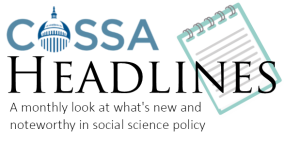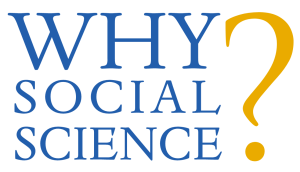Issue 14 (July 7)
COSSA Washington Update, Volume 39 Issue 14
Featured News
- Federal Research Agencies Release Guidance on OMB’s Administrative Flexibility Changes
- Notable COVID-19 Resources
COSSA in Action
- July’s Headlines Webinar to Feature Deep Dive Discussion on NSF/NASEM Network to Answer COVID Policy Questions
- “Why Social Science?” Features Experts on Policing
Congressional News
- Funding for DOD Social Science Research Restored in House and Senate Defense Authorization Bills
- RISE Act Would Provide Relief Funding for Federally Funded Scientists
- House Committee Releases Climate Policy Report, Recommends Strengthening of Research Enterprise
- Recent Reports
Federal Agency & Administration News
- Census Releases Updated Demonstration Data Products
- PCAST Holds Virtual Meeting, Swears in New Members from Academia
- NIMHD Seeking Research Applications Addressing COVID-19 Consequences on Vulnerable Populations
- Nomination Opportunities
- Funding Opportunities
- Notices & Requests for Comment
Community News & Reports
Federal Research Agencies Release Guidance on OMB’s Administrative Flexibility Changes
In response to a June 18 memo (M 20-26) issued by the White House Office of Management and Budget (OMB) extending certain administrative flexibilities to federal grant recipients as relief for the ongoing COVID-19 pandemic, federal research agencies have released guidance statements clarifying the memo’s implications for recipients of research grants. On June 25, both the National Institutes of Health (NIH) and the National Science Foundation (NSF) released nearly identical sets of guidance in response to the OMB memo explaining how the changes to the flexibilities will specifically affect recipients of their grants. The flexibilities include an allowance to continue charging salaries, benefits, and other applicable program costs to active NIH and NSF awards through September 30, 2020 (assuming that payroll costs have not already been paid through other COVID-19 relief programs), and an extension of the single audit submission deadline by up to three months.
More information is available on the NIH website and the NSF website.
July’s Headlines Webinar to Feature Deep Dive Discussion on NSF/NASEM Network to Answer COVID Policy Questions
 COSSA members are encouraged to sign up for the monthly Headlines webchat on Thursday, July 9 at 2:00 pm Eastern Time. The COSSA team will break down the most important social and behavioral science news from the past month, followed by a deep dive discussion with Dr. Monica Feit, Deputy Executive Director of the Academies’ Division of Behavioral and Social Sciences and Education (DBASSE) on the Societal Experts Action Network (SEAN), an initiative of the National Academies of Sciences, Engineering, and Medicine (NASEM) and the National Science Foundation (NSF) to deploy the social sciences to answer urgent COVID-19 policy questions. Individuals employed by or affiliated with a COSSA member organization or university can register for the webchat here.
COSSA members are encouraged to sign up for the monthly Headlines webchat on Thursday, July 9 at 2:00 pm Eastern Time. The COSSA team will break down the most important social and behavioral science news from the past month, followed by a deep dive discussion with Dr. Monica Feit, Deputy Executive Director of the Academies’ Division of Behavioral and Social Sciences and Education (DBASSE) on the Societal Experts Action Network (SEAN), an initiative of the National Academies of Sciences, Engineering, and Medicine (NASEM) and the National Science Foundation (NSF) to deploy the social sciences to answer urgent COVID-19 policy questions. Individuals employed by or affiliated with a COSSA member organization or university can register for the webchat here.
“Why Social Science?” Features Experts on Policing
 The latest Why Social Science? post features an article from The Conversation that asked several social scientists who study different aspects of policing to explain what their research has found that could help reduce police prejudice and violence. Read it here and subscribe.
The latest Why Social Science? post features an article from The Conversation that asked several social scientists who study different aspects of policing to explain what their research has found that could help reduce police prejudice and violence. Read it here and subscribe.
Funding for DOD Social Science Research Restored in House and Senate Defense Authorization Bills
Both the House and Senate’s drafts of the annual authorization bill for the Department of Defense (DOD), the National Defense Authorization Act (NDAA), include language preventing the elimination of funding for DOD’s basic social science research program, the Minerva Research Initiative, as proposed in the Administration’s budget request for fiscal year (FY) 2021. Both bills propose a total of $17 million in the Defense-Wide funding line for the Minerva initiative, which if enacted would be a sizeable increase over the $11.4 million the program received in FY 2020. While the Minerva Initiative receives some funding from the Navy and Air Force, Defense-Wide funding accounts for the majority of its budget.
Both bills include language in support of the Minerva Initiative and social science research at the Department of Defense more generally. They contain nearly-identical language asserting that maintaining America’s technological superiority “requires not only investing in physical sciences but also the integration of cross-disciplinary research that explores the social, cultural, behavioral, political, historical, and religious drivers of today’s increasingly complex global security environment.” In addition, both bills would require that DOD report back on how it plans to continue to cultivate the social sciences within the Department.
The Senate NDAA (report) was approved by the Armed Services Committee on June 23. Floor debate began on July 1 and continued until the Senate adjourned for a two-week recess on July 2. The Senate will resume consideration when it returns on July 20. Among the amendments proposed for consideration are a version of Senator Charles Schumer’s (D-NY) Endless Frontier Act, which as previously reported, proposes sweeping structural changes for the National Science Foundation (NSF). Should the amendment pass, it would fall to the conference committee to negotiate whether and in what form the legislation would be included in the final bill.
The House Armed Services Committee approved its version of the bill (Intelligence and Emerging Threats and Capabilities mark) on July 1. A timeline for consideration by the full House is unclear, but the NDAA is considered “must-pass” legislation by the end of the fiscal year on September 30.
RISE Act Would Provide Relief Funding for Federally Funded Scientists
On June 24, Representatives Diana DeGette (D-CO) and Fred Upton (R-MI) introduced the Research Investment to Spark the Economy (RISE) Act (H.R. 7308), which would authorize $26 billion in relief funding for federal science agencies to support researchers affected by the COVID-19 pandemic. The funds could be used to enable graduate students, post-doctoral researchers, and Principal Investigators to complete work that was disrupted by COVID-19, or extend the training or employment of researchers on an existing research project for up to two years because of the disruption of the job market. The bill follows a similar Dear Colleague Letter led by DeGette and Upton in April with 180 Members of Congress signing on. A timeline for consideration and potential passage of the bill remains unclear. While it would be a likely candidate for inclusion in a larger COVID-19 aid package, the House is still waiting for the Senate to introduce a counterpart to its previously passed COVID-19 relief bill before it considers a new one.
House Committee Releases Climate Policy Report, Recommends Strengthening of Research Enterprise
On June 30, the House Select Committee on the Climate Crisis majority staff released the report Solving the Climate Crisis: The Congressional Action Plan for a Clean Energy Economy and a Healthy, Resilient, and Just America, a sweeping set of policy recommendations to address and combat climate change. The report recommends several initiatives to be taken by the U.S. government that would expand the federal science and technology sector’s ability to address climate change, including strengthening the research enterprise.
Some of the recommendations that are relevant to the social and behavioral science research enterprise include:
- Expanding and sustaining funding for federal agencies to support research and monitoring of climate change’s impact on human systems;
- Expanding support for climate STEM career training and education by emphasizing the removal of barriers for underrepresented groups;
- Directing the National Science Foundation (NSF) to support research on methodologies to improve education and training of climate scientists;
- Requiring strong scientific integrity policies at federal research agencies; and
- Reviving the Congressional Office of Technology Assessment (OTA) and increase funding for the Congressional Research Service (CRS) and the Government Accountability Office (GAO) to better inform Congress about science and technology policy.
The full report and more information is available on the Committee website.
Census Releases Updated Demonstration Data Products
The Census Bureau has released a new set of demonstration data products that show how its new disclosure avoidance strategy (DAS) will impact the quality of its 2020 Census data products (see previous coverage). The Census Bureau is releasing a set of benchmark metrics to track the impact of the ongoing development and improvements to its privacy-protecting algorithm on data accuracy. These metrics will be updated every six weeks so data users can track the ongoing improvements Bureau staff are making to the algorithm. In addition, the Census Bureau has released a set of privacy-protected microdata files (PPMF) to allow users to assess the impact of the disclosure avoidance strategy for their own specific use cases. The Bureau notes that “while the data in the PPMFs look like individual records, all of the data are privacy-protected. The microdata records generated by the DAS ensure respondent privacy through the application of differentially private statistical noise. The microdata included in the PPMF do not include any actual census responses.”
Data users can submit feedback or questions to the Census Bureau by emailing 2020DAS@census.gov. More information about the new data products is available on the Census Bureau website.
PCAST Holds Virtual Meeting, Swears in New Members from Academia
On June 30, the President’s Council of Advisors on Science and Technology (PCAST) held a virtual meeting during which two new members of PCAST were sworn in. Abraham “Avi” Loeb, Professor and Chair of the Department of Astronomy at Harvard University, and Daniela Rus, Director of the Computer Science and Artificial Intelligence Laboratory at the Massachusetts Institute of Technology, were sworn in after being nominated in April amid discussions that new PCAST nominees would represent academia given that representatives from industry have already been appointed (see previous COSSA coverage for more details).
Much of the meeting was dedicated to discussing recommendations for the Administration’s Industries of the Future (IotF) initiative, which include strategically important tech industries such as quantum and artificial intelligence. The meeting focused on four main discussions:
- Enhancing multi-sector engagement in IotF research and innovation;
- Meeting national needs for a diverse, multi-sector IotF workforce;
- New models of engagement for national laboratories; and
- Students, post-doctoral scholars, and early career professionals in IotF.
More information about PCAST, presentation slides, and the meeting agenda can be found on the Department of Energy’s (DOE) Office of Science website.
NIMHD Seeking Research Applications Addressing COVID-19 Consequences on Vulnerable Populations
The National Institute on Minority Health and Health Disparities (NIMHD) within the National Institutes of Health (NIH) announced a new funding opportunity for community interventions to address the consequences of the COVID-19 pandemic among health disparity and vulnerable populations. The announcement specifically encourages applicants to address adverse psychosocial, behavioral, and socioeconomic consequences of the pandemic on the health of these populations. Applications open on July 28 and will be accepted through August 28. More information is available on the NIMHD website.

